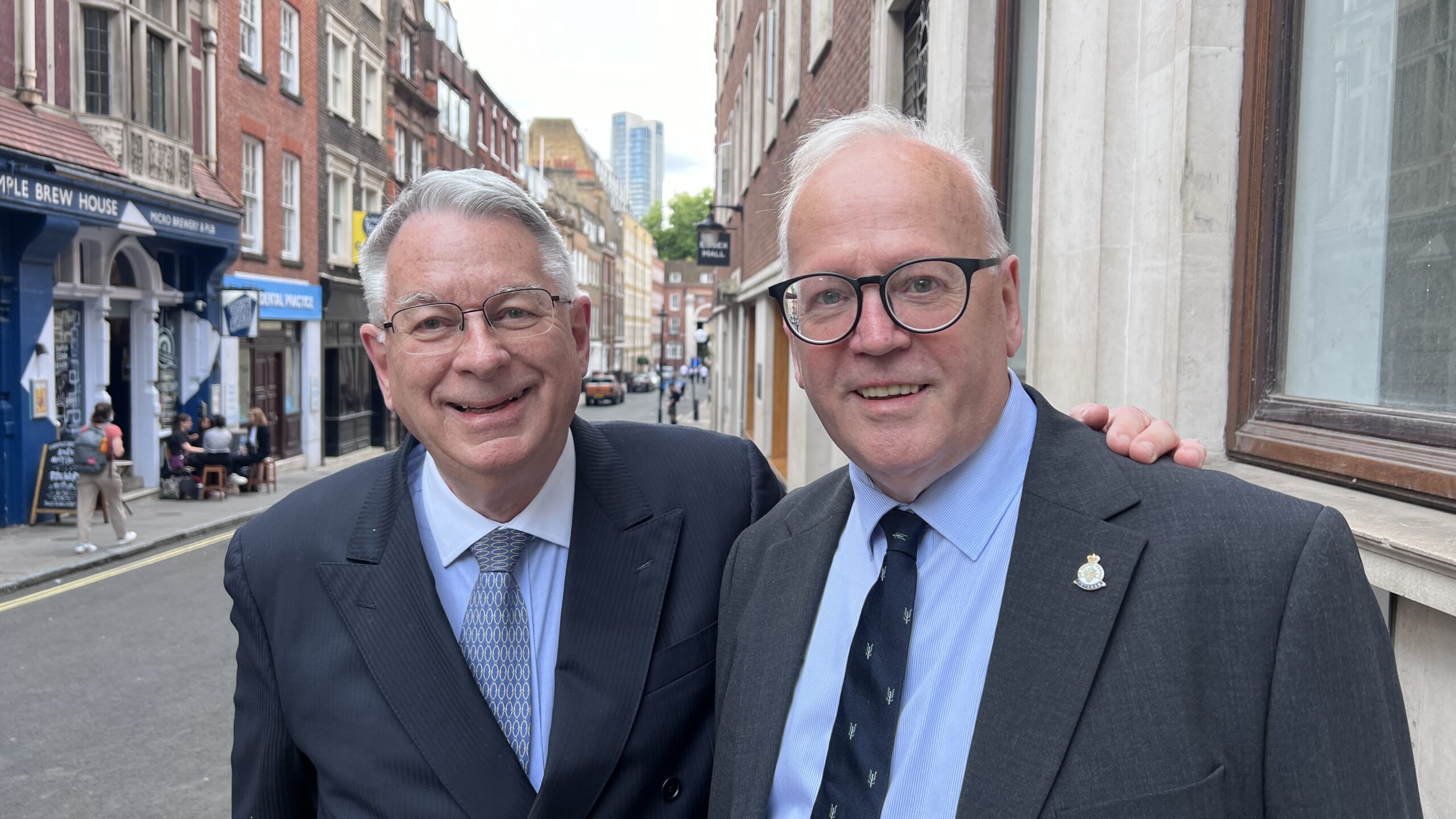
“Good luck” said a reporter as Ron Warmington headed into Aldwych House. Warmington wheeled round. “Don’t need bloody luck”, he grinned. “I’ve been waiting twelve years for this.”
Indeed he has. In 2012 forensic accountants Ron Warmington and Ian Henderson were invited by MPs, the Justice for Subpostmasters Alliance (JFSA) and the Post Office to investigate Subpostmaster complaints surrounding the Horizon IT system. They were contracted to the Post Office via Warmington’s consultancy vehicle Second Sight. Second Sight’s seminal Interim Report, produced in July 2013, drew attention to serious problems at the Post Office, noting three bugs with the Horizon IT system, failures in business processes and an established “asset-recovery or prosecution bias” amongst the Post Office’s in-house audit and investigation staff who “fail to seek the root cause of reported problems”.
On Tuesday the circumstances surrounding the production of the Interim Report and the totality of Second Sight’s work at the Post Office between 2012 and 2015 was explored at the Post Office Horizon IT Inquiry with Jason Beer KC.
In response to Beer’s question as to why Second Sight was put forward by the Post Office for approval by MPs and the JFSA, Warmington exclaimed: “We were cheap!”
There is more to it than that – we know that James Arbuthnot (then Jo Hamilton’s MP) did not want one of the big four accountancy firms to investigate (though Deloitte was considered by the Post Office), and of course, Ron and Ian had the right professional credentials, but cost was certainly a significant factor.
The horrors within
Within days of Ian Henderson setting up a mini-office within the Post Office’s legal department he found serious problems. The first case file he pulled down was Jo Hamilton’s. In it he found Post Office investigator Graham Brander’s report, which stated:
“Having analysed the Horizon printouts and accounting documentation I was unable to find any evidence of theft or that the cash figures had been deliberately inflated.”
Within days of Brander filing his report, Jo Hamilton was charged with theft and false accounting.
Henderson told Beer he considered Brander’s finding “quite an astonishing statement in the context of what [Jo] was charged with”. In his view it was “exculpatory evidence that had not been disclosed to Mrs Hamilton or her legal team.”
The pushback from the Post Office was immediate. Warmington told the Inquiry ‘as soon as Ian came to me and said, “Look what I’ve found, I’m finding some really odd stuff in these legal files’,” the Post Office’s stated intention to “be transparent” began to cloud.
The departure of Susan Crichton in September 2013 hastened the Post Office’s slide towards adversarial denial.
Ian Henderson told Beer of being threatened by her replacement as General Counsel, Chris Aujard. According to Henderson’s witness statement Aujard “warned me to be careful about what I said. He told me that if I said anything that harmed the Post Office, [it] would not hesitate to take legal action against me under the terms of my Non-Disclosure Agreement and that I would not be able to afford the legal fees.”
Henderson wrote “I took this as a thinly veiled threat to bankrupt me if I continued causing trouble.”
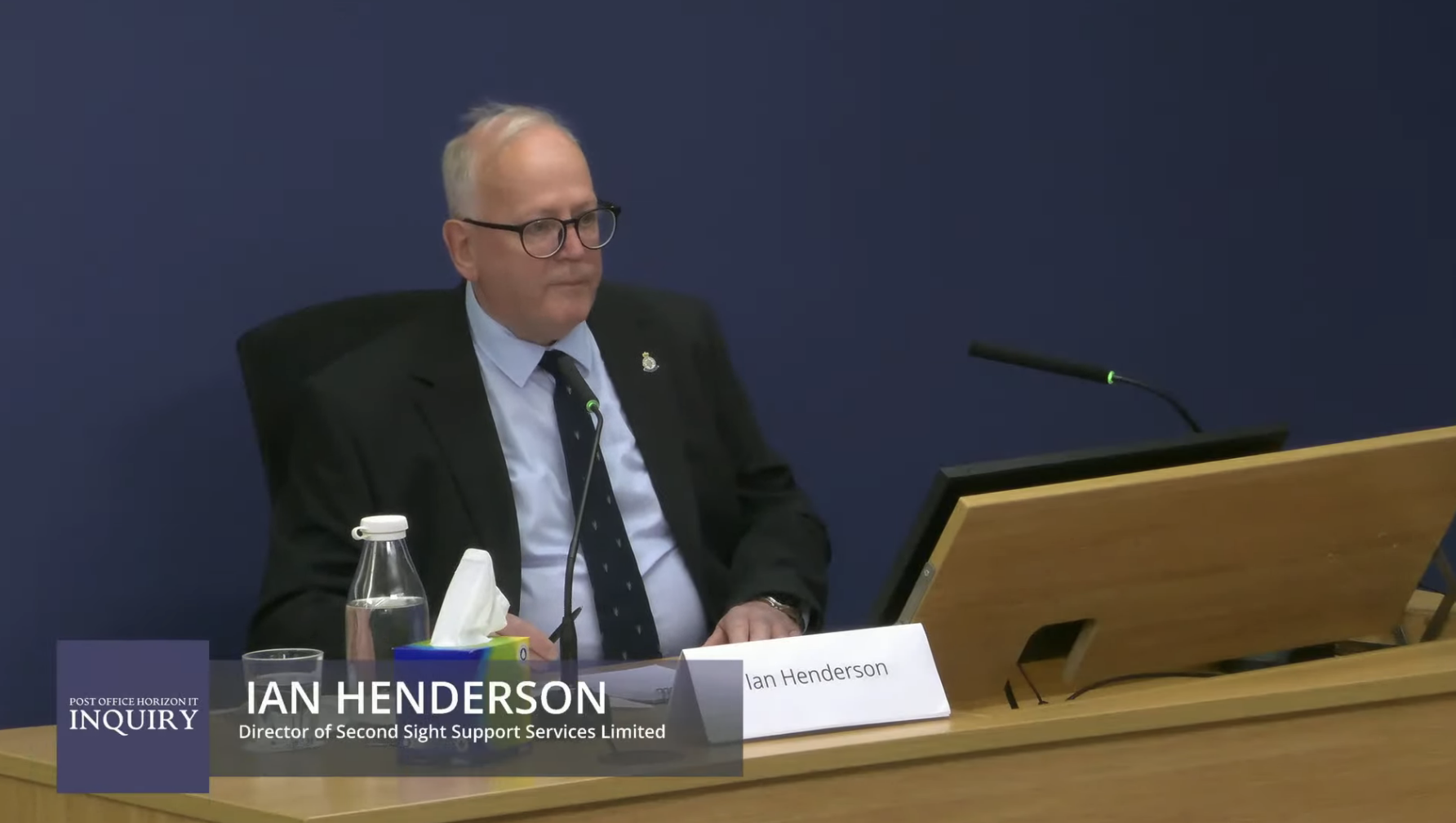
Beer asked Henderson more about this on Tuesday. Henderson described Aujard (who has already given evidence to the Inquiry) as a “frankly somewhat aggressive lawyer” which was “reflected in the way that he dealt with Second Sight”. Henderson told Beer that Aujard “was obviously concerned about some of the things that I was saying or raising in working group meetings, and yeah, I remember this [threat]. I thought it was inappropriate.”
Beer harked back to an earlier comment in his witness statement that at the start of their investigation, both Second Sight and the Post Office had a shared desire to “seek the truth, irrespective of circumstances”.
“I think we’d moved on from that”, replied Henderson, drily, to laughter in the room.
The rather obvious problem
Warmington told the Inquiry he warned Susan Crichton about potential miscarriages of justice and the failures of the Post Office investigators as soon as he became aware of it in 2012. Crichton commissioned a report by Warmington on the Post Office’s investigation function, which got its first public airing when Chris Aujard gave evidence (see “enemy of the business“). Today the Inquiry focused on the what Warmington said to Crichton about the safety of the Post Office’s prosecutions. In his Witness Statement Ron Warmington wrote:
“During a meeting with her I said that, whereas I was confident that Second Sight had the ability to assess the adequacy of evidence in cases of suspected fraud and financial theft, we were Forensic Accountants, not lawyers experienced in criminal prosecutions or defence, so it was essential that our findings be quickly, thoroughly and independently either ratified or refuted by a competent barrister experienced in criminal cases. Susan who, like practically every other General Counsel that I had ever met, claimed no expertise herself in matters of criminal prosecution, said that she would take the matter to Cartwright King.”
Cartwright King were the legal firm who had been carrying out prosecutions on behalf of the Post Office. Warmington continued:
“I remember very clearly that I laughed out loud at that, to my mind, simply preposterous suggestion and responded by saying that Cartwright King would, in my opinion, be an entirely unsuitable choice, because they could not ever be viewed as independent and they would, in effect, then be `marking their own homework’. I recommended instead that she go to a higher-ranking firm and suggested some names. I was astonished at Susan’s response which was along the lines of: “that won’t work, the Board won’t approve that sort of expense”. I responded with words along the lines of “Well then, you’re all fucking* mad… this is an extraordinarily important issue, why is cost in any way relevant?”.
Beer wanted to know why Second Sight’s verbally expressed concerns didn’t find their way into their Interim Report in July 2013. It’s a good question. Warmington replied that the Interim Report:
“was produced in order to just come out with something that evidenced the work that was going on, and had gone on, and it wasn’t intended to cover all of the issues that were still open. My view on this was: Toddle off, get the independent view and have the decency to share it with us.”
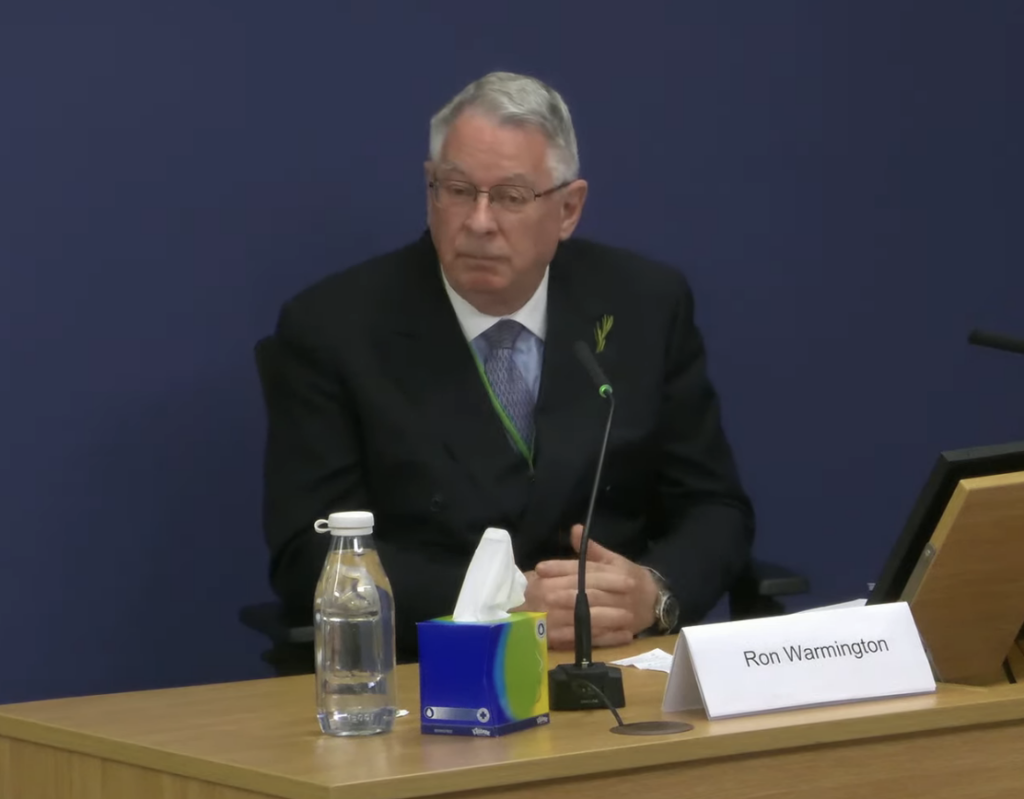
Warmington agreed “with the benefit of hindsight” his and Henderson’s “embryonic or as-yet-unconcluded thoughts” about miscarriages of justice “could have been dumped out in the Interim Report, but we didn’t.”
As we now know, the Interim Report led to the First Clarke Advice which prompted a review (by Cartwright King) of all Post Office prosecutions after 2010. This was so inept neither Cartwright King, nor Brian Altman KC (brought in to mark Cartwright King’s homework) felt that Seema Misra should be told about a Post Office expert witness in her case who they all agreed was “fatally undermined”. Fujitsu’s Gareth Jenkins had given evidence during Seema’s trial, but failed to disclose crucial information which undermined the Post Office’s case.
No systemic issues
From listening to Post Office executives earlier in this phase of the Inquiry and Second Sight’s evidence on Tuesday it does seem as if the Interim Report was delivered mainly to give the MPs something to show for Second Sight’s twelve months of work.
As far as the authors were concerned, this was a working document and their job was nowhere near finished (the clue is in the title). Nonetheless, the Post Office glommed on to one Interim Report conclusion and waved it around in everyone’s faces for years. The line was:
“We have so far found no evidence of system wide (systemic) problems with the Horizon software.”
This, in the Post Office’s hands, became the mantra: “no systemic problems/issues with Horizon”. During her three days of giving evidence, former Post Office CEO Paula Vennells agreed the Post Office had used variations on this phrase to convince themselves and others that there were, er, no systemic problems with Horizon. When asked, she was completely unable to define what systemic meant. She also admitted no steps had been taken within the Post Office to define what systemic meant, which effectively renders the mantra meaningless. Second Sight must also take their share of responsibility for this.
Beer raised it with first with Henderson. When he was asked about the use of “systemic” in both Second Sight’s terms of reference and their Interim Report, Henderson said:
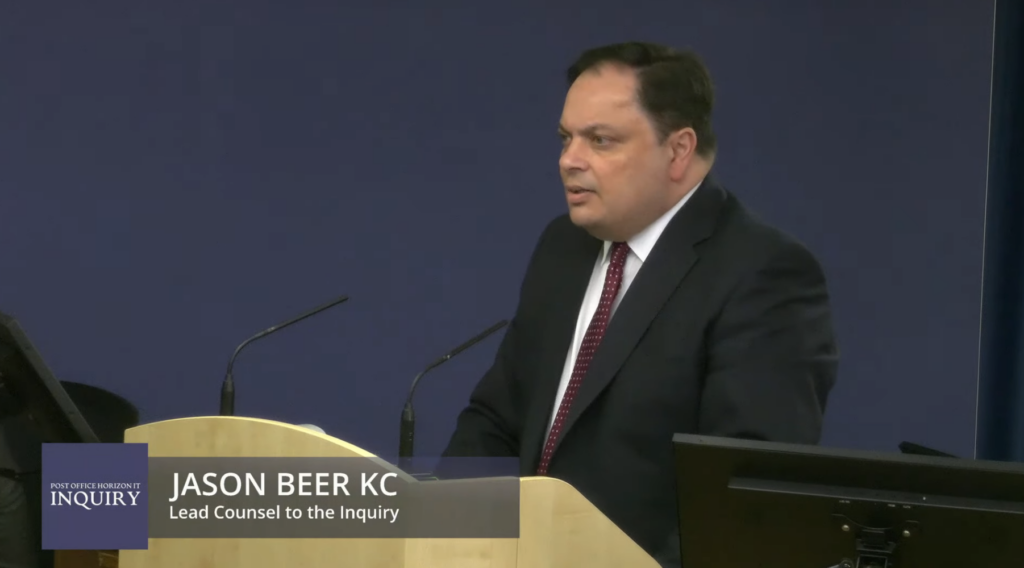
“I was using the Oxford English Dictionary of systemic, in other words of the whole system: system-wide. Alan [Bates],
I think, saw “systemic” as caused by the system, which is a much narrower definition and it certainly had the potential to cause confusion.”
Beer wondered if any attempt was made by the Post Office, Second Sight, the JFSA or MPs was made to define what systemic meant?
Henderson replied: “Not that I can recall.”
Beer asked: “Was the effect of the use of word “systemic” or the phrase “systemic issues”… to allow the focus to be on the fact that there were no system-wide issues with Horizon, thus diverting attention or focus away from bugs, errors and defects which did exist?”
Henderson replied: “I think that was how it was used by Post Office. I do recall various press releases, and so on, that trumpeted the fact that Post Office claimed that we had said that we had found no systemic or system-wide issues with the Horizon system, which was, of course, not what we said at all.”
Henderson told Beer he was disappointed with the way the word was jumped on by the Post Office. “I felt it was probably somewhat misleading. It was not a phrase that we would have chosen, even though we did adopt it and use it in our report. It was widely misunderstood and was not clear communication.”
When Beer took Warmington to the fateful line in his report, Beer raised another anomaly – namely how on earth Second Sight could have come to any conclusion about system-wide issues from the source material they were looking at. Beer asked: “On the investigation of how many cases was that preliminary conclusion formed?”
Warmington replied: “I think it was about 50… 49… something like that. We had, I think, 29 cases from the MPs, 18 from the JFSA, that’s 47 by my counting. So I think it was based on those. But, of course, we’d narrowed that down. We had to, because we… investigating 49 cases right across the detail wasn’t feasible, so that’s where I think Ian came up with… what we called spot reviews: just focus on events within a case and dig into those.”
There were four published “spot review” cases at the back of the Interim Report.
“Is it right, therefore,” asked Beer, “that that conclusion [ie no evidence of systemic problems] is based ultimately on the examination of four cases?”
It did sound ridiculous. Warmington replied: “I think, by that point, we had about… we had 20-something spot reviews but only four of them had really been bottomed out and, even then, one of them was Spot Review 5, the Rudkin matter, which hadn’t been bottomed out. So there were still lots of unanswered questions as we wrote this.”
“So” continued Beer, “that preliminary conclusion was reached on the basis of the four cases that had been investigated… one of which was still incomplete?”
“Yes” replied Warmington.
“Do you think, on reflection, that ought to have been made clearer… so that it might not be misused or misappropriated by others for a different purpose?” asked Beer.
“Well, with the benefits of hindsight, absolutely”, Warmington replied. “I wish we’d said that. I think Ian mentioned earlier, it would have been probably better if we’d spelled out exactly what we meant by “systemic”. We didn’t use the word by accident and a considerable amount of thought and discussion went into the word we used there. But, with the benefit of hindsight, Post Office pounced on it and, as Ian said, trumpeted it from the rooftops, and Alan [Bates] had warned us that that would happen…. Sir Alan, as we all know, is pretty astute, and I think he foresaw better than I did the danger of this.”
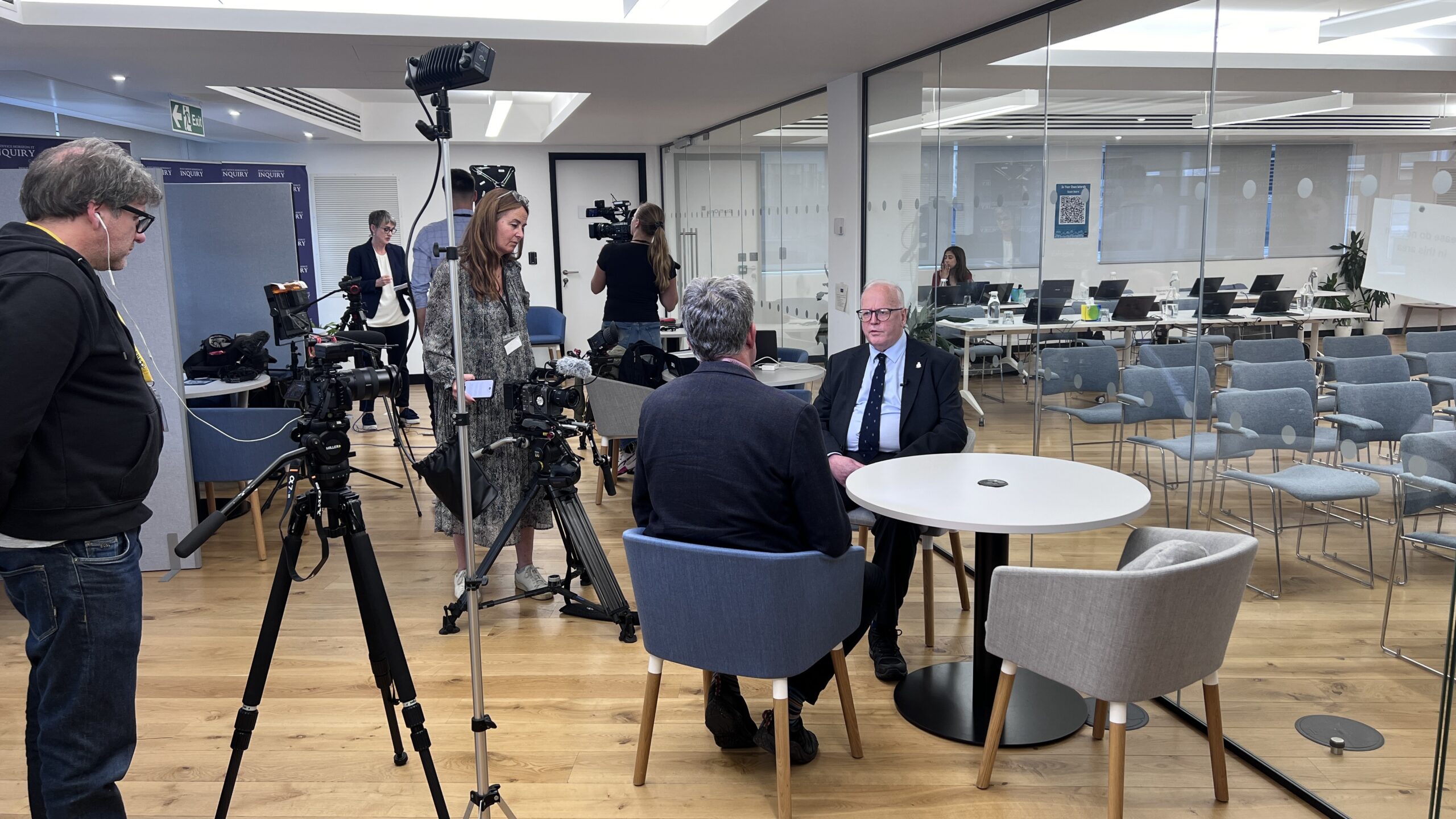
Eleven years on, Warmington got to the nub of it:
“Systemic, to us, meant that this was something that was occurring right through the network of the 12,000-odd branches, and, had there been such systemic bugs, they would have been glaringly obvious to quite a lot of the people. That was the opposite of what we’d found. What we found was that the… bugs or other forms of error and defect that were manifesting themselves were unusual, were rare, but had life-changing impact on those that the bugs hit, but
were inconsequential in the context of the entirety of the system.”
Warmington admitted that his use of the word systemic at the time of his work at the Post Office was “a little bit muddle headed”. He told Beer “I wish we’d never used it, you know. We did, we used it advisedly, we gave it a lot of thought but it led to such abuse that I wish we’d used a different form of words.”
Love in the room, news outside it
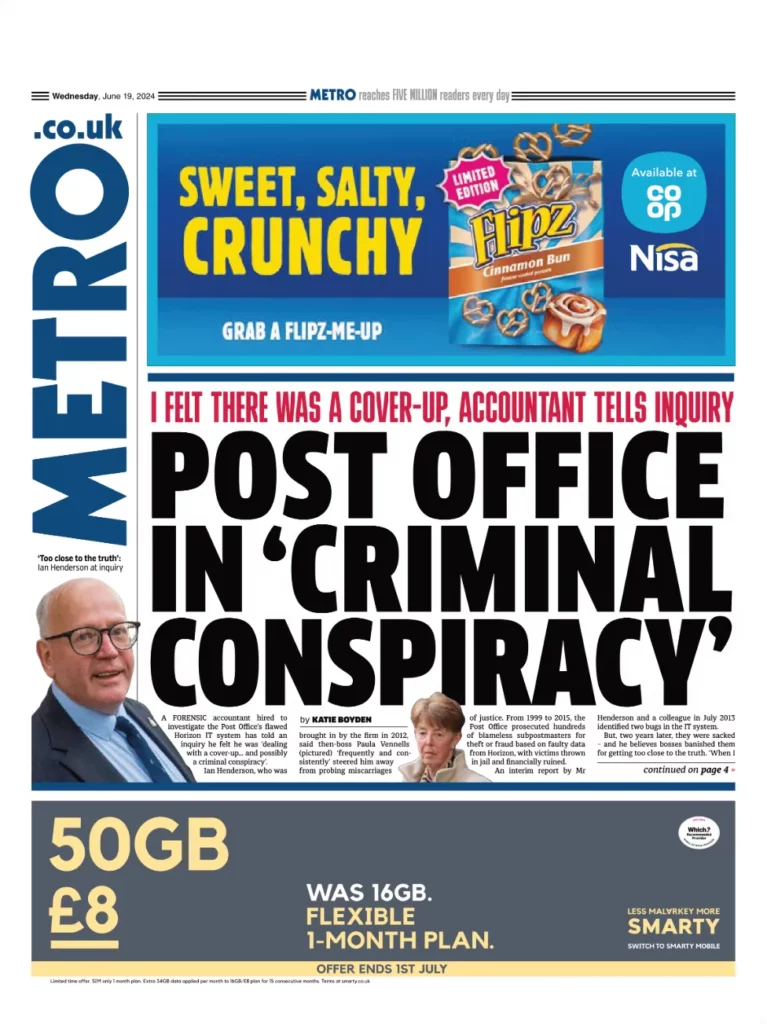
The inquiry hearing room was more-or-less full on Tuesday. Many Subpostmasters had travelled many miles to show their support for Ron and Ian, including Deirdre and Darius Connolly, who had flown in from Belfast, Nichola and Steve Arch who had come up from Gloucestershire with Wendy Buffrey. There was a good media turnout, too, reflected in the number of news reports covering Ron and Ian’s testimony.
The Metro put Second Sight front and centre today (see pic). The piece’s online headline is “Forensic accountants sacked by Post Office for ‘getting too close to the truth’“
The Law Gazette picked up on the Post Office’s reaction to Second Sight’s concerns over the Brander report – citing Henderson’s feeling the Post Office lawyers were potentially conspiring to pervert the course of justice in attempting to suppress it.
The Guardian focused on Ian Henderson’s interactions with Paula Vennells and his observation the Post Office was “constantly sabotaging” Second Sight’s efforts.
Swinson speaks!
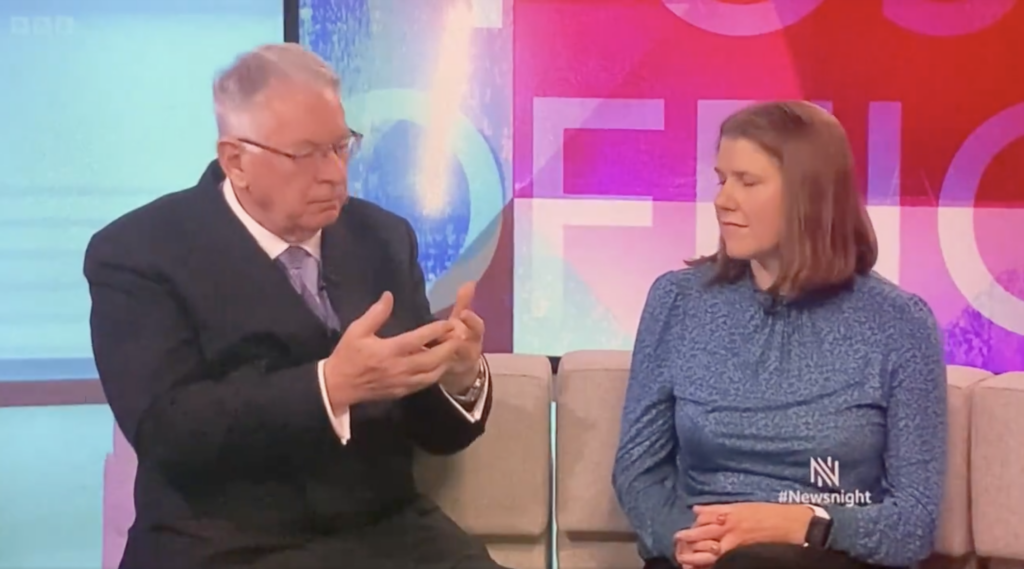
Ron Warmington’s evening finished very late, sitting on the Newsnight sofa with former Post Office minister Jo Swinson, who was giving her first ever (to my knowledge) broadcast interview about the scandal. Former Subpostmaster Chris Head has clipped out the discussion here. Right at the very end of the interview Warmington asks Swinson why on earth he was not brought into Swinson’s office to explain Second Sight’s conclusions in their final, suppressed 2015 report.
Swinson flannelled:
“This is a very good question… the 2015 report which, incidentally, I had to fight to have government allowed to receive a copy… that to me seemed bizarrre… that copy will have been received as I was leaving office. I don’t know whether my successor was given that report or whatever, but I mean, the officials in the department ought to have been reading that report and I don’t understand how that cannot have raised alarm bells in terms of the content of that report. That to me is one of these mysteries as why that was not seen to be something which needed to be investigated.”
I hope the inquiry pushes Swinson further on this when she gives evidence on Friday 19 July. Why didn’t she call Warmington and Henderson in to explain to her what was going on? She knew their report was controversial. Did she read it? Did she leave instructions to her officials? We all know what happens when matters get left to the mandarins…
If you’d like to read a blow-by-blow account of the day’s evidence with all sorts of interesting documents – click here.
* in the published version of Warmington’s witness statement this expletive was redacted. Beer noted, to laughter in the room, it had been “caught by our data protection machine”. I can exclusively confirm the word used above is correct, because I have seen an unredacted version of Ron’s witness statement.
The journalism on this blog is crowdfunded. If you would like to join the “secret email” newsletter, please consider making a one-off donation. The money is used to keep the contents of this website free. You will receive irregular, but informative email updates about the Post Office Horizon IT scandal.

Leave a Reply